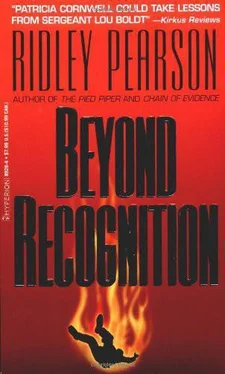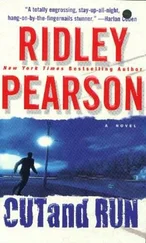Ridley Pearson - Beyond Recognition
Здесь есть возможность читать онлайн «Ridley Pearson - Beyond Recognition» весь текст электронной книги совершенно бесплатно (целиком полную версию без сокращений). В некоторых случаях можно слушать аудио, скачать через торрент в формате fb2 и присутствует краткое содержание. Жанр: Триллер, на английском языке. Описание произведения, (предисловие) а так же отзывы посетителей доступны на портале библиотеки ЛибКат.
- Название:Beyond Recognition
- Автор:
- Жанр:
- Год:неизвестен
- ISBN:нет данных
- Рейтинг книги:5 / 5. Голосов: 1
-
Избранное:Добавить в избранное
- Отзывы:
-
Ваша оценка:
- 100
- 1
- 2
- 3
- 4
- 5
Beyond Recognition: краткое содержание, описание и аннотация
Предлагаем к чтению аннотацию, описание, краткое содержание или предисловие (зависит от того, что написал сам автор книги «Beyond Recognition»). Если вы не нашли необходимую информацию о книге — напишите в комментариях, мы постараемся отыскать её.
Beyond Recognition — читать онлайн бесплатно полную книгу (весь текст) целиком
Ниже представлен текст книги, разбитый по страницам. Система сохранения места последней прочитанной страницы, позволяет с удобством читать онлайн бесплатно книгу «Beyond Recognition», без необходимости каждый раз заново искать на чём Вы остановились. Поставьте закладку, и сможете в любой момент перейти на страницу, на которой закончили чтение.
Интервал:
Закладка:
Daphne let the boy have some distance. She owed the two of them a moment in private, given all she had put them through. A part of her had no desire even to greet Emily, to give the woman a chance to wield her power over the boy and dominate him the way she knew was possible. She would not turn this into an emotional tug-of-war, not for anything. She would not put the boy through that; worse, she would not inflict it upon herself, for she knew this was a game she was certain to lose, and at that point in time she could not afford to lose the boy and his dependence on her. It was a delicate line to walk, and she walked it with one eye glued to the scene before her but with her head turned down in indifference. The human heart is more fragile than one ever expects, she thought.
She strolled the bike path, unfamiliar with it, intrigued by a series of stone posts that rose to knee height on either side. She approached the nearest of these stone posts, admiring the tile work at its base.
The tile held an odd stick-figure drawing, evoking a Native American pictograph. Surrounding the tile’s perimeter were words. It took her a moment to discern where the sentence began. But it wasn’t a sentence, she realized; it was a quotation: “Crooked is the path of eternity.” Nietzsche. She hurried to the next post: more primitive art and a quote from Lao-tsu: “The way that can be told, is not the constant way.” Heart pounding, she hurried to the next, reading words emblazoned on her memory: “Suddenly a flash of understanding, a spark that leaps across the soul.” Plato. The same quote that had accompanied a melted piece of green plastic. One post to the next, like a bee to flowers. A dozen such quotations and pictographs. She stopped and stared: “He has half the deed done who has made a beginning.”
The first of the threats: Dorothy Enwright. She had profiled the suspect as highly educated, a scholar! He was nothing more than a plagiarist who had walked or ridden through this park. The Bible-thumping disturbed man in the trees had not lined up well for her with the poetic intellect, but with this discovery the two melded into one: A plagiarist, with little education and the need to appear smart; a mind steeped in biblical significance; a sociopath intent on burning or disfiguring women.
There on that bike path she found each and every quote mailed to Garman. And then the most important thought of all: The arsonist used this section of bike path-he lived somewhere in the area.
“Quick, Ben!” she shouted from a great distance. “We have to go. Right now!”
48
Boldt was awaiting a meeting with King County Medical Examiner Dr. Ronald Dixon, in the basement of the Harborview Medical Center, when Dr. Roy McClure, a friend of Dixon’s and Liz’s internist, approached him and shook hands.
The waiting area was foam couches and three-month-old celebrity magazines.
The two men shook hands. McClure perched himself on the edge of the couch.
“How are you taking it?” McClure asked gravely, with great sympathy in his calming eyes.
“It’s unsettling,” Boldt admitted.
“I should say it is. The real battle is psychological. Attitude is ninety percent of the game.”
“Yeah,” Boldt agreed.
“How about the kids?”
“The kids?”
“Miles and Sarah,” McClure answered.
“They’re fine, I think,” Boldt answered. “I haven’t seen them in a while, quite honestly. Liz has had them.”
“Well, I certainly understand that,” McClure replied.
“You know, Roy, I get the feeling that we’re having two different conversations here.”
“You’ll feel that way from time to time. The world won’t make any sense. The temptation may be to bury yourself in work, but the more prudent course is to talk it out. Sit her down and tell her how much you’re rooting for her, give her every ounce of support you can.”
“I was talking about work,” Boldt stated. He felt too tired for any conversation. He wished McClure would go away.
“I’m talking about Elizabeth.” It wasn’t the doctor’s words that jolted Boldt so much as the ominous tone of voice in which they were delivered. Boldt felt a sickening nausea twist his stomach.
“Liz?”
“You’re not in denial, are you?”
“Roy, what in bloody hell are you talking about?” the sergeant blurted out. “I’m too tired for this.”
“I’m talking about your wife’s lymphoma, Lou. I’m talking about your wife’s life. Your children. You. How you are all coping with this.”
Boldt’s ears rang as if someone had detonated an explosive in the room. He felt bloodless and cold. His head swam and he felt dizzy. His eyes stung, and his fingers went numb, and though he struggled to get out some words, nothing happened. He was paralyzed. He could not move, or speak, or even blink his eyes. Tears gushed down his cheeks as if someone had stuck his eyes with a knife. He felt himself swoon. McClure’s mouth was moving, but no sound issued from it. No words came forth. The doctor’s face twisted into a knot of concern, and it was clear to Boldt that the numbness and the ringing in his ears was his flirtation with unconsciousness-he was passing out.
McClure’s strong grip upon his shoulders brought Boldt back just far enough to hear the words, “She didn’t tell you.” It was a statement. Definitive.
Boldt felt himself shake his head. “Is it …?” He couldn’t say the word. To speak it was to cast negative thoughts. He convinced himself that he had heard wrong. “Did you say …?” But McClure’s expression was enough. Boldt pictured her looking so sad in the bathtub, recalled the regular baths that had seemed so out of place, her request to spend time with one of the children by herself. The pieces of the puzzle suddenly came together like they did occasionally in an investigation.
“It metastasized quickly,” McClure answered. “Stage Four by the time we caught it. She must have known, Lou, but she evidently couldn’t bring herself to face it. It was the kids, I think.”
Tears continued to cascade down his face.
“The surgery is scheduled for next week,” McClure said, soberly and dryly. “I’m counting on your support through all this. She needs every bit of strength we can offer her.”
Boldt felt trapped inside a small dark box. He could shout as loudly as he wanted, but no one could hear him. He could open his eyes wide, but could not see. It was a dream, he convinced himself, nothing more. A nightmare. He would awaken and find himself at Harborview, on the couch, awaiting his meeting with Dixie. It was guilt playing a nasty trick on his subconscious.
But McClure did not go away.
“The baths?” Boldt mumbled, and somehow McClure understood the question.
“They help with the pain,” he said. “She’s in a tremendous amount of pain.”
There were many shades to gray. There was the gray of forgiveness between the black and white of knowledge, the gray of age at the temples, the gray of a mirror’s reflection, the gray of a weathered headstone in a graveyard. Boldt caught a glimpse of himself in the crooked rearview mirror as he drove straight home.
He drove with tears in his eyes, his shoulders shaking, his lips trembling; only the siren filled his ears. Time had stopped, and yet a clock ran inside his head and heart as never before. So many memories, all tangled up in a man’s stubborn refusal to let go. Guilt banged at his chest for distrusting her. He recalled their baby in her arms and at her breast, the two of them in the bath, and he dragged his shirtsleeve over his face to relieve his eyes.
Every second, every moment seemed a lost opportunity. So many had passed while he took their love and their life together for granted. At that point, racing toward the final turn in the road, he wanted it all back, like an athlete with a lost game. It seemed so fast, so quick. They had been building toward something, making a life. In the process their lives had been crossed, lost a few times. They had drifted apart and back together, like boats riding the ebb and flow of the tides. She so private-so unfair. He felt anger, love, fear, and terror all combine in an inescapable emotional avalanche, with him at the bottom looking up. One did not run for cover from such things but steeled the body and soul to face the inescapable. He didn’t want to believe it, to buy into it. There was always hope, he reminded himself, always a miracle waiting. Was it too late to pray? Anger surged through him. He didn’t want this life alone. He didn’t want a world without Liz. It wasn’t fair. It wasn’t what they had planned.
Читать дальшеИнтервал:
Закладка:
Похожие книги на «Beyond Recognition»
Представляем Вашему вниманию похожие книги на «Beyond Recognition» списком для выбора. Мы отобрали схожую по названию и смыслу литературу в надежде предоставить читателям больше вариантов отыскать новые, интересные, ещё непрочитанные произведения.
Обсуждение, отзывы о книге «Beyond Recognition» и просто собственные мнения читателей. Оставьте ваши комментарии, напишите, что Вы думаете о произведении, его смысле или главных героях. Укажите что конкретно понравилось, а что нет, и почему Вы так считаете.












